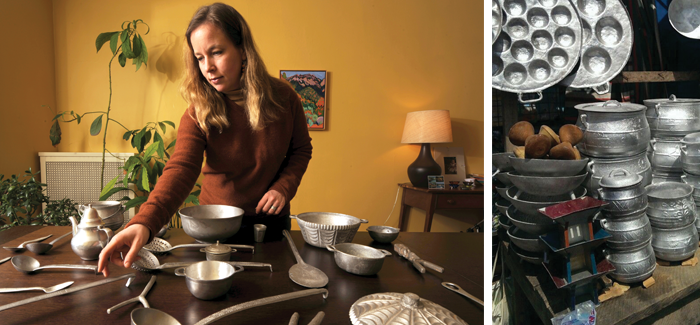
While in Ghana, Emily Osborn (pictured here at home in Chicago) observed artisans who cast aluminum pots and pans (right). This work helps her engage with issues like the diffusion of technologies and Africa’s position within the global economy. (Photography by Dan Dry; photo courtesy Emily Osborn)
The Department of History’s Emily Osborn and Tara Zahra discuss how a break from teaching stimulates their focus on research.
The Division of the Social Sciences faculty-leave program allows faculty members to dedicate up to a full academic year to research, free of their usual teaching responsibilities. Tara Zahra, professor of East European history, traveled to Europe to research emigration from East Central Europe since 1889. For Emily Osborn, associate professor of African history, her research leave was a chance to focus on the diffusion of aluminum casting through West Africa after World War II.
Zahra and Osborn discuss their research in an interview with Dialogo, edited and adapted below.
Where did you go, and what did you do while you were there?
Zahra: I’ve spent most of the year in Europe. In the fall I was a fellow at the America Academy in Berlin, which is a residential center for scholars, artists, writers, and policy makers. Currently I’m a Fernand Braudel Fellow at the European University Institute in Florence. I’m continuing to write here, trying to learn more about emigration from Italy and taking advantage of the stimulating company of scholars from across Europe. I’ve also visited archives in Prague, Poland, and Washington, DC.
Osborn: I went to Ghana for a couple of weeks, but for the most part I’ve stayed in Chicago. I’m a faculty fellow at the Franke Institute, which is a really engaging and dynamic community that has exposed me to faculty and graduate students from the Division of the Humanities. And I’ve been able to devote myself to writing.
How did you choose your research destinations?
Zahra: I knew I wanted to spend most of the year in Europe to be close to my archives. But I also wanted to be in places where there would be some kind of intellectual community, so that I wouldn’t be too isolated. Berlin and Florence just happen to have really excellent residential fellowship programs.
Osborn: I went to a conference marking the 50th anniversary of the Institute of African Studies at the University of Ghana in Legon. It was a great opportunity to support a center for African studies in Africa, many of which are underfunded and lack institutional support. This one is quite a dynamic and important center, so I wanted to go and celebrate with them.
Why is research leave important for your work and for scholars in general?
Zahra: Sustained periods of research are essential to historical research. The sources I work with aren’t typically online—I need to go to archives and dig through boxes of old documents. That takes a lot of time. As a historian of modern Europe, it’s also important for me to spend substantial amounts of time here. It stimulates my imagination and enables me to stay in touch with what’s happening here intellectually, culturally, and politically.
Osborn: Part of what makes teaching at the University of Chicago a great privilege is how wonderful and engaging and demanding our students are, be they graduates or undergraduates, who test us and challenge us all the time. As a result, you dedicate a lot of time to teaching your classes, working with students, advising theses and dissertations—and that eats away at the time you can devote to research. So being able to stay here and do my own work has been really important.
What are your most vivid memories from research leave?
Osborn: Just having the luxury of being able to walk into my office and conduct my own research—I’ve been doing a lot of online research with visual materials—and doing that over vast expanses of time. I can spend a whole day working on one particular part of one particular chapter, uninterrupted. It’s very intellectually stimulating.
Zahra: I had a mishap this year: I broke my foot in Berlin while dancing and had to have surgery there. That was memorable! But my encounter with the German health care system was also pretty interesting, and fortunately it’s really excellent, so I’m on my feet and dancing again.
